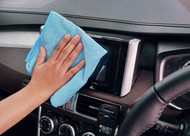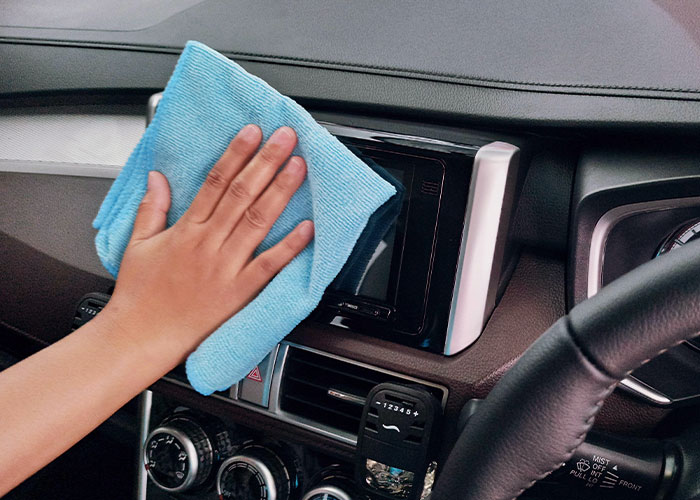5 Car Maintenance Tips For Summer Season
2nd May 2024
As summer rolls in with its soaring temperatures, it’s important to ensure your car is primed to handle the heat.
In this blog, we will explore five essential car maintenance tips to prepare your car for the summer season, covering everything from the air conditioning system to the condition of your tires.
Let’s get started!
How Does Summer Heat Affect Your Car's Performance?
Summer heat significantly affects a car's performance in several ways. Here is a breakdown of how high temperatures can impact various components of your vehicle:
Engine Overheating
The most common issue faced by vehicles in the summer is overheating. The engine has to work harder in the heat. If the cooling system is not efficient due to low coolant levels, a malfunctioning radiator, or a failing water pump—the risk of overheating increases. This leads to serious engine damage.
Battery Wear
Car batteries are more susceptible to wear in high temperatures. Heat can accelerate the chemical reaction inside a battery, leading to quicker depletion and reduced overall lifespan. It also causes the battery fluid to evaporate faster, which damages the internal structure of the battery.
Tire Pressure Fluctuations
As temperatures rise, the air inside your tires expands, often leading to over inflation. This can make your tires more prone to wear and tear or even blowouts. Conversely, driving with underinflated tires, which might happen as temperatures vary, increases rolling resistance and reduces fuel efficiency.
Air Conditioning Stress
During summer, car’s air conditioning is likely to run more frequently and harder. This extra load on the engine can reduce fuel efficiency. If the system isn’t maintained, it could fail from overuse, making driving conditions uncomfortable and potentially unsafe.
Oil Viscosity and Lubrication
Heat affects the viscosity of engine oil. As it heats up, oil tends to thin out, which can reduce its effectiveness in lubricating the engine and lead to increased wear and tear. It’s important to check and change the oil regularly, possibly opting for a higher viscosity oil if recommended by your vehicle manufacturer.
Fuel Evaporation
Higher temperatures can lead to increased fuel evaporation. Keeping the car in a shaded spot and ensuring your fuel system is in good working order can help mitigate this issue.
5 Car Maintenance Tips For Summer Season
Here are five detailed car maintenance tips for the summer season:
Tip 1: Optimize the Air Conditioning System
Before the peak of summer, have your air conditioning system checked by a professional. This includes inspecting the compressor, belts, and other components for signs of wear and ensuring there are no leaks. If the system isn’t cooling efficiently, it may need to be recharged with refrigerant. Regular cabin filter replacements can also improve airflow and cooling efficiency.
Tip 2: Monitor and Maintain the Cooling System
The cooling system plays a vital role in preventing engine overheating. Start by checking the coolant level in the overflow tank; it should be between the "low" and "full" marks. Inspect the radiator and hoses for cracks, leaks, or any signs of aging. Consider replacing the coolant every two years, or as recommended by your vehicle’s manufacturer. Additionally, make sure the radiator cap seals properly and maintains the correct pressure.
Tip 3: Test and Replace the Battery if Necessary
Battery fluid can evaporate in high temperatures, leading to a decrease in battery life. Inspect the battery for signs of bulging, cracking, or leaking. Test the battery's charge with a voltmeter, and ensure the connections are clean, tight, and free of corrosion. If the battery is more than three years old, it might be a good idea to have it tested at a service center to determine if it needs replacing.
Tip 4: Check Tire Pressure and Condition
Tire pressure should be checked at least once a month during the summer, as it can fluctuate with changing temperatures. Refer to your vehicle's owner manual for the recommended pressure and adjust accordingly. Also, inspect the tires for tread wear and any damage like cuts, bulges, or punctures. Rotate your tires as recommended and consider replacing them if the tread is worn down to 2/32 of an inch or less.
Tip 5: Replace Windshield Wipers and Fluid
Visibility is key during sudden summer downpours. Replace windshield wipers that streak or don’t clear the glass in a single swipe. Fill up your windshield washer reservoir with a good quality washer fluid that can help remove bugs and road grime. Also, consider applying a water repellant treatment on the windshield to improve visibility during heavy rain.
Must-Have Car Maintenance Tools
Proper car maintenance is key to ensuring your vehicle runs smoothly and efficiently. To perform a variety of repairs and inspections, you'll need to have the right tools on hand. Below is a comprehensive list of essential tools, categorized by their specific uses:
Basic Hand Tools
- Socket Set: Includes various sizes, both standard and metric, for numerous maintenance tasks.
- Wrench Set: Combination of open-end and box-end wrenches, along with adjustable wrenches for tasks requiring more torque.
- Screwdrivers: A set with various sizes of flat-head and Phillips-head screwdrivers.
- Pliers: Includes needle-nose, slip-joint, and wire-stripping pliers for gripping, bending, and cutting.
Specialty Tools
- Torque Wrench: Ensures that nuts and bolts are tightened to the specified torque.
- Oil Filter Wrench: Facilitates the removal of oil filters during oil changes.
- Multimeter: Essential for electrical diagnostics, measuring voltage, current, and resistance.
- Code Reader/Scanner: For modern vehicles, it reads and erases trouble codes, essential for diagnosing electronic-related issues.
Lifting and Support Equipment
- Car Jack: Necessary for lifting the car for tire changes and undercarriage access.
- Jack Stands: Used to safely support the vehicle once it is lifted with a car jack.
Diagnostic and Inspection Tools
- Work Lights/Flashlight: LED lights or flashlights for visibility in dim areas during maintenance.
- Inspection Mirror: Helps in inspecting hard-to-see areas around the engine or under the car.
Safety Gear
- Mechanic Gloves: Protects hands during work.
- Safety Glasses: Protects eyes from potential hazards like splashing fluids or flying debris.
Sign Up For JB Tools Newsletter And Save More On Car Maintenance Tools
Subscribe to JB Tools newsletter and gain access to exclusive deals, expert tips, and the latest updates on our extensive range of car maintenance tools. Enjoy special subscriber-only discounts that help you save more on high-quality tools. Don't miss out on the opportunity to enhance your toolkit at great prices. Sign up today and start saving with JB Tools!


